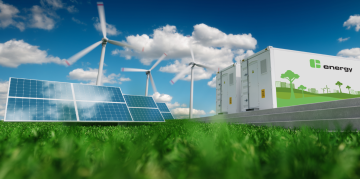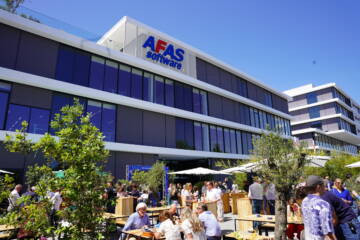Future-proof Redox Flow battery technology offers economic, ecological and safety advantages

C-energy, part of Cordeel Group, has signed a licensing and R&D agreement for the commercialisation, production and optimisation of Vanadium Redox Flow batteries (VRFB), a complementary battery technology aimed at economical, ecological and safe longer-term energy storage.
C-energy, part of Cordeel Group, has signed a licensing and R&D agreement for the commercialisation, production and optimisation of Vanadium Redox Flow batteries (VRFB), a complementary battery technology aimed at economical, ecological and safe longer-term energy storage.
C-energy, part of Cordeel Group, has signed a licensing and R&D agreement with the Dalian Institute of Chemical Physics (DICP) of the Chinese Academy of Sciences (CAS) for the commercialisation, production and optimisation of Vanadium Redox Flow batteries (VRFB). Via this cooperation C-energy wants to offer a complementary battery technology aimed at economical, ecological and safe longer-term energy storage.
C-energy develops new sustainable technologies and applications that provide an answer to the energy transition and all of its attendant challenges. These include all aspects of energy management, storage, optimisation and trading. In order to further expand and optimise the Energy-as-a-Service offer, it entered into an agreement with DICP. "DICP is an authority in the research and development of Redox Flow batteries, and has extensive experience in cooperation with companies and technology transfer", says Dany Bosteels, Out-Of-The-Box Manager at Cordeel Group who established the first contacts with DICP.
António Guterres, Secretary-General of the United Nations, recently called for a ´Global coalition on battery storage´ during the launch of the World Meteorological Organisation´s State of the Global Climate 2021 Report. Guterres emphasised the crucial role that battery storage can play in tackling the global climate crisis. He advocated treating renewable technologies, such as battery energy storage systems, as essential and freely-available global public goods by removing obstacles to knowledge sharing and technology transfer, including intellectual property constraints.
"Battery storage of electricity will become crucial to further optimise the energy consumption of our customers. C-energy already offers lithium-ion batteries through its subsidiary C-battery, but will soon be able to supplement this offer with Redox Flow batteries.” says Niko Bonnyns, Project Director at C-energy. “The agreement with DICP comprises both the use of the existing basic technology and a research collaboration for the further development of this technology in order to optimally facilitate our projects and serve our customers.”
A Redox Flow battery consists of a stack where the battery power is determined (W), and a storage of electrolyte where the battery capacity is secured (Wh). In this project Vanadium forms the active component in the electrolyte.
Because power and capacity are decoupled, this type of battery is ideally suited for the storage and release of energy from renewable sources such as wind and solar farms, but there are also many benefits to be gained in industrial applications.
In the case of a solar panel installation, for example, on average there are typically 4 peak sun hours per day, usually in the period with the lowest energy consumption, during which the battery is charged. The battery is then discharged during peak consumption periods.
The same applies for wind farms: energy is stored during periods of high wind and then released when there is less wind.
"Electricity storage is a key element in the Belgian energy strategy. With our ambition of quadrupling our offshore wind capacity in the North Sea by 2040, we will need flexible capacities such as batteries to balance the grid and compensate for fluctuations of wind and solar energy." - Minister of Energy Tinne Van der Straeten
This optimal distribution of storage and release plays a crucial role in making energy management more sustainable by aiming for grid stabilisation. The RFB technology in fact offers design freedom between power and capacity, making one less dependent on imbalances between renewable electricity production and electricity consumption. Because we are striving for more production of renewable energy and because this production is not always simultaneous with the consumption, it is important to invest in storage. This type of storage is also extremely future-proof as, when there is a demand for higher capacity, the volume can be scaled up by making more electrolytic fluid available.
The RFB technology is fully complementary to that of lithium-ion batteries but offers some important advantages. For example, the cost per cycle is significantly lower than with lithium-ion batteries, and they offer a longer service life of up to 25 years. There is also a great added value from an ecological point of view. Redox Flow batteries can be more easily recycled and the mining process is secured in the long term because the basic raw material is available in greater quantities in the earth´s crust than lithium. And in terms of safety, Redox Flow batteries have the upper hand because there is no risk of fire. The only challenge is that RFB installations need a little more space, but this can be designed in a perfectly flexible way to suit the application.
With this partnership, C-energy and Cordeel Group are taking yet another step in the fulfilment of their mission ´Building a passionate CO2-free future´. This project, including the planned in-house assembly of the batteries, and further extensive investments in R&D, also in the long term, confirms their ambition as European players determined to make an active contribution to the energy transition. The group´s ambition is to use logistics centres as energy hubs in the future and to offer a total approach towards obtaining a sustainable cradle-to-cradle future.
Renewable energy is good for everyone: for the wallet and for the planet. But it is also a job-creating opportunity and a major asset for the influence of Belgium abroad via innovation and know-how". - Minister of Energy Tinne Van der Straeten
Latest insights & stories

A Global Movement: The World Unites in a Pink Pledge for Clean and Sustainable Water
5,000 participants. 32 countries. €30,000 funds raised. And that's just the beginning.
Picture this: One step that sends ripples across the globe, transforming lives and creating waves of change. You might wonder, how can such a simple action for most of us have such a profound impact?

RainTunes: Douchescenario's voor de ziel
Licht, geluid, geur en aanraking: samen met experts hebben we sensuele scenario's ontwikkeld die van douchen een persoonlijke ervaring maken. Of je je nu wilt voorbereiden op de komende dag of wilt ontspannen na een workout. Of je je wilt opfrissen na een dag werken of wilt ontspannen aan het eind van de avond: RainTunes verrast met multisensorische ervaringen.*
*Momenteel enkel in Duitsland en Oostenrijk verkrijgbaar.

De toekomst van werk: de vierdaagse, 32-uren werkweek omarmen met AFAS
Living Tomorrow, toegewijd aan het onderzoeken van de toekomst van werk, deelt haar inzichten over een baanbrekend initiatief van onze gewaardeerde partner, AFAS Software. Dit vooruitdenkende bedrijf heeft een gedurfde stap gezet om het traditionele werkparadigma te herdefiniëren door een vierdaagse werkweek van 32 uur te introduceren voor al zijn werknemers.